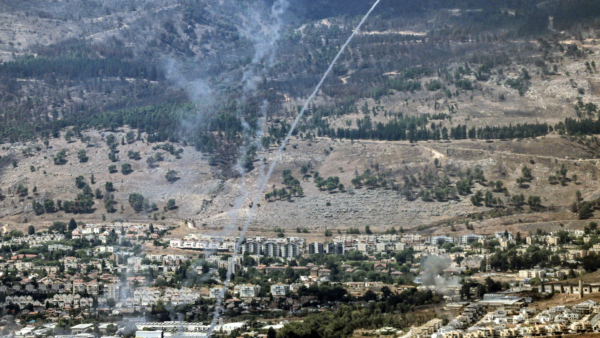File: Rockets fired from southern Lebanon are intercepted by Israel’s Iron Dome air defense system over northern Israel on Sept. 4, 2024. Photo: Jalaa Marey/AFP via Getty Images
Senior officials from the U.S. and Israel held a low-profile virtual meeting on Tuesday to discuss how to ease tensions with Lebanon and prevent an all out war between Israel and Hezbollah, four Israeli and U.S. officials said.
The meeting, which hasn’t been announced by the White House or the Israeli government, was initiated by the Biden administration to take the pulse on the Israeli side and coordinate their policies about the situation in Lebanon, officials said.
Ten days ago, Israel and Hezbollah engaged in the most extensive exchange of fire since the the Shiite group attacked Israel on Oct. 8.
- Israel Defense Forces conducted a preemptive strike ahead of what Israeli and U.S. intelligence said was expected to be a major missile and drone attack on Israel by Hezbollah.
- Hezbollah had vowed to retaliate for the assassination of its top military commander in Beirut by Israel.
- After several hours of massive air strikes and rocket fire, both sides declared victory and stepped back from the brink and the fear of an escalation to a regional war decreased.
- But in recent days, the daily skirmishes between Israel and Hezbollah intensified again, raising new concerns about regional escalation.
The virtual meeting lasted an hour. The U.S. team was led by White House national Security Adviser Jake Sullivan. President Biden’s advisers Amos Hochstein and Brett McGurk also participated. The Israeli team was led by the Minister for Strategic Affairs and Netanyahu confidant Ron Dermer, officials say.
- According to an Israeli official, the parties discussed how to reach a long-term diplomatic solution to end the fighting between Israel and Hezbollah in a scenario where a ceasefire deal is reached in Gaza and hundreds of thousands of displaced Israelis and Lebanese are allowed to return to their homes along the border.
- But the official said the parties also discussed how to de-escalate the fighting in the more likely scenario at the moment of no Gaza ceasefire deal in the near term.
- AXIOS


Leave a Reply
You must be logged in to post a comment.